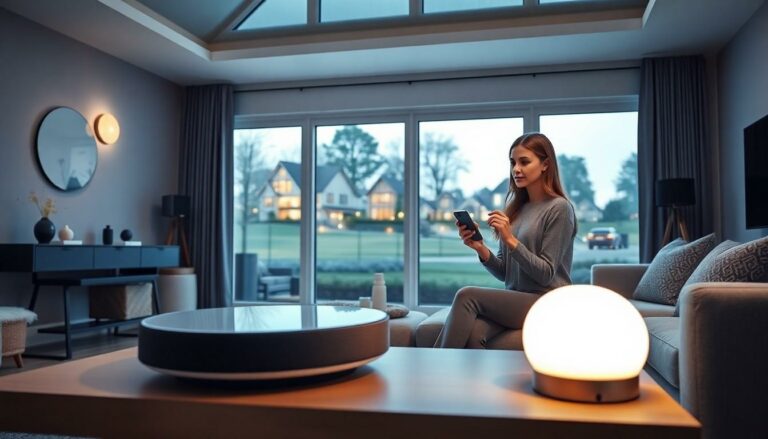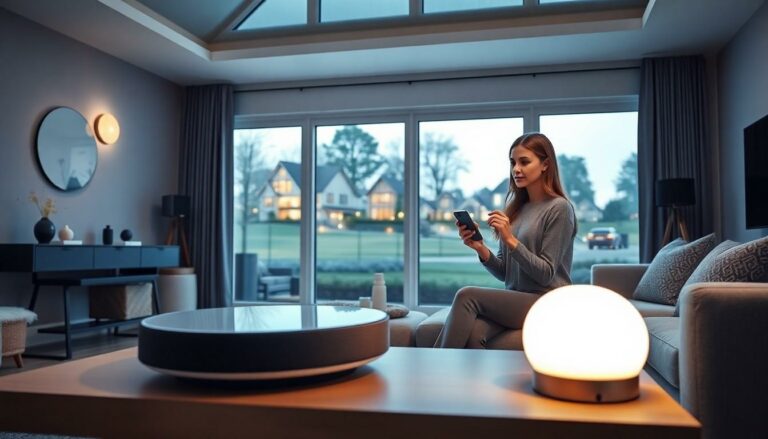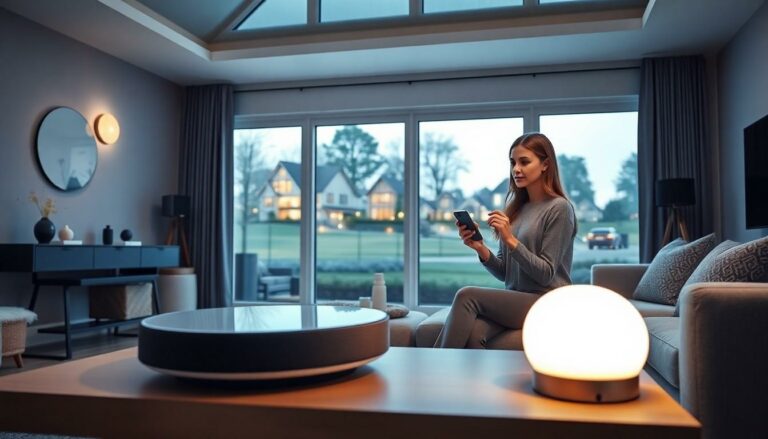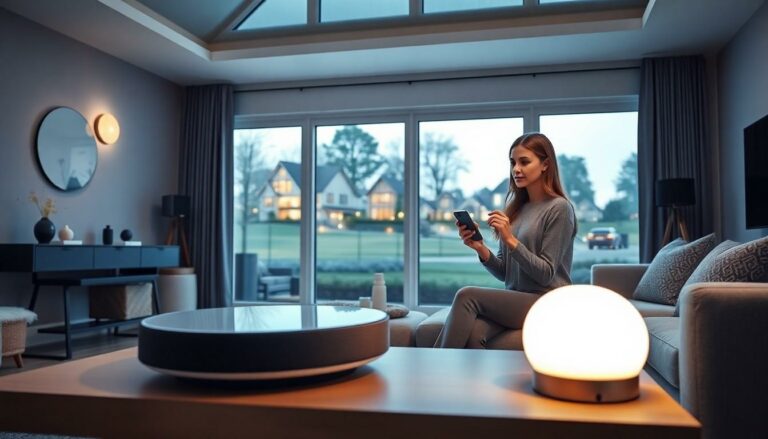Table of Contents
ToggleImagine waking up to a home that knows your morning routine better than you do. The future of smart homes isn’t just about fancy gadgets; it’s about creating a space that anticipates needs and simplifies life. With technology evolving faster than a cat video goes viral, these homes are set to transform everyday living into something straight out of a sci-fi movie—minus the flying cars, of course.
Overview of Smart Home Technology
Smart home technology integrates devices and systems for an enhanced living experience. This technology streamlines daily tasks, increases energy efficiency, and prioritizes security, making homes more user-friendly.
Current Trends in Smart Homes
Growing interest in smart home technology exists among consumers. The adoption of voice-activated assistants, such as Amazon Alexa and Google Assistant, shows a significant increase in smart home devices. IoT (Internet of Things) is a driving force, connecting various appliances for seamless communication. Additionally, energy-efficient solutions, like smart thermostats and lighting, gain popularity as homeowners prioritize sustainability. Innovations in security systems, including smart locks and surveillance cameras, enhance home safety. Consequently, the trend toward home automation only strengthens over time.
Key Players in the Smart Home Market
Numerous companies lead the smart home market. Giants like Google, Amazon, and Apple dominate with their ecosystems. Their products range from smart speakers to integrated home control systems. Other notable manufacturers, such as Philips Hue and Nest, focus on lighting and climate control. Additionally, companies like Samsung and LG contribute to the market with their vast array of smart appliances. Partnerships among these key players help broaden consumer choices and improve product compatibility. This competitive landscape fosters innovation and inspires the development of new technologies for smart homes.
Innovations Shaping the Future of Smart Homes
Smart homes continuously evolve, driven by innovative technologies that enhance functionality and user experience.
Artificial Intelligence and Machine Learning
Artificial intelligence (AI) and machine learning enable smart homes to learn and adapt to residents’ preferences. Devices equipped with AI analyze usage patterns, optimizing energy consumption and automatically adjusting settings. For instance, smart thermostats can anticipate temperature needs based on prior behavior, ensuring comfort while conserving energy. Voice-activated assistants, like Amazon Alexa and Google Assistant, leverage AI to create personalized interactions, responding to natural language queries. Innovative algorithms enhance automation, allowing systems to anticipate routines and execute commands seamlessly. Overall, these advancements create a dynamic home environment that actively supports lifestyle demands.
Internet of Things (IoT) Advancements
The Internet of Things (IoT) propels connectivity among devices, achieving an integrated smart home experience. With IoT, appliances and systems communicate effectively, sharing data for improved operation. Smart lighting, for example, can adjust based on occupancy, reducing energy waste. Security systems benefit from IoT advancements through real-time updates and monitoring, alerting homeowners to potential threats instantly. Moreover, compatibility between diverse brands fosters an expansive ecosystem, allowing for tailored solutions to meet individual needs. Enhanced user interfaces provide intuitive management of interconnected devices, simplifying control over home environments. These features illustrate the significant role IoT plays in future smart homes.
Benefits of Smart Homes
Smart homes offer numerous advantages that enhance daily living experiences. These benefits span energy efficiency, security, and user convenience.
Energy Efficiency and Sustainability
Energy efficiency plays a crucial role in smart homes. Smart thermostats adjust temperatures based on occupancy patterns, reducing waste. Homeowners can monitor energy usage in real-time through connected devices. Intelligent lighting systems dim or brighten based on natural light availability, optimizing energy consumption. Such innovations contribute to sustainability efforts, enabling users to decrease their carbon footprint. Many smart appliances minimize energy usage during peak periods, leading to cost savings on utility bills. The combination of these technologies supports a greener lifestyle while ensuring comfort.
Enhanced Security Features
Enhanced security features significantly improve home safety. Smart locks allow for keyless entry and remote access, offering convenience to homeowners. Surveillance cameras provide live feeds directly to devices, ensuring vigilance at all times. Alerts from motion sensors keep residents informed of any unusual activity around their homes. Integration with security systems enables automatic responses to breaches, such as notifying local authorities. Additionally, smart home systems can engage lights or alarms when emergencies are detected, ensuring a proactive defense. The amalgamation of these features promotes peace of mind, facilitating safer living environments.
Challenges Facing Smart Homes
Smart homes encounter several challenges that could impede their growth and acceptance among consumers. Addressing these issues is crucial for unlocking the full potential of smart living.
Privacy Concerns
Privacy concerns arise as smart home devices collect vast amounts of user data. Homeowners worry about unauthorized access to their personal information, creating anxiety surrounding data security. Cybersecurity threats increase with more interconnected devices, making it essential for manufacturers to implement robust security measures. Regulations like GDPR aim to protect consumer data, but compliance can vary among companies. Transparency about data usage is important for building trust with users. Ensuring strong encryption methods can mitigate risks linked to data breaches. Manufacturers must prioritize privacy features while developing innovative smart home solutions.
Integration and Compatibility Issues
Integration and compatibility issues present challenges as various smart devices from different manufacturers enter the market. Homeowners often find it difficult to connect devices seamlessly due to differing communication protocols. Many systems operate on distinct ecosystems, leading to frustration for users attempting to unify their devices. Compatibility among platforms, such as Amazon Alexa and Google Home, is essential for a smooth smart home experience. Fragmentation can hinder the ability to automate processes effectively, which limits the utility of smart homes. To overcome these hurdles, manufacturers must collaborate and adopt universal standards for device communication. Prioritizing compatibility promotes user-friendly environments, enhancing the appeal of smart homes.
Predictions for the Future of Smart Homes
The future of smart homes promises innovative changes. The integration of cutting-edge technologies will redefine the living experience.
Emerging Technologies
Artificial intelligence leads the way in smart home advancements. Enhanced algorithms will allow devices to learn user habits, optimizing energy consumption and streamlining daily tasks. Furthermore, advancements in home automation will enable seamless device interaction, reducing barriers between appliances. Smart sensors will increasingly monitor home environments, providing real-time data to enhance comfort and security. Blockchain technology may also secure transactions and data, boosting consumer trust as safety concerns grow.
Consumer Adoption Trends
Growing consumer interest in smart home technology reflects an ongoing shift in lifestyle preferences. Increased awareness of energy conservation influences many homeowners to adopt smart devices. Additionally, the rise of voice-activated assistants simplifies user experience, making technology more accessible. As consumers prioritize convenience, compatibility among devices becomes critical. More households will embrace the holistic benefits of smart homes, with a focus on sustainability and security playing pivotal roles in their decision-making.
The future of smart homes promises to revolutionize everyday living with enhanced convenience and sustainability. As technology advances and consumer interest grows, homes will increasingly adapt to individual needs while prioritizing energy efficiency and security.
Emerging innovations like AI and IoT will create seamless interactions among devices, making life easier and more efficient. While challenges such as privacy concerns and compatibility issues remain, the industry is poised for growth.
With major companies leading the charge and a focus on user-friendly solutions, smart homes will soon become a standard in modern living, transforming how people experience their environments. As these advancements unfold, homeowners can look forward to a more connected and intelligent living space.






